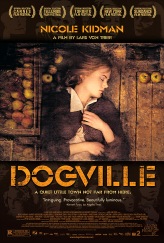| Dogville |
| |
 |
Denmark/Sweden/France/Norway/Netherlands/Finland/Germany/Italy/Japan/USA/UK, 2003. Rated R. 177 minutes.
Cast:
Nicole Kidman, Paul Bettany, Stellan Skarsgård, Patricia Clarkson, Chloë Sevigny, Lauren Bacall, Ben Gazzara, Jeremy Davies, Philip Baker Hall, Željko Ivanek, Harriet Andersson, Blair Brown, Siobhan Fallon Hogan, Cleo King, Bill Raymond, Miles Purinton, James Caan, John Hurt (voice)
Writer: Lars Von Trier
Music: Antonio Vivaldi
Cinematography: Anthony Dod Mantle
Producer: Vibeke Windeløv
Director: Lars Von Trier
LINKS
|
Although the author has avoided discussing the plot in detail, this analysis does contain minor spoilers .
 remiering to international acclaim at Cannes nearly a year ago, Lars Von Trier's Dogville finally reaches these shores with its reputation for anti-Americanism preceding it. Whether the reputation is justified is not really the point. Sure, the implication Von Trier makes—that the United States has reaped what it has sown with the terrorist attacks of September 11st—is explosive, but let's not be naïve about this. We know quite a lot of people outside the United States feel that way. The idea that on some level the terrorist attacks were justified is reprehensible. On the other hand, Dogville is not out of order in calling attention to hypocrisies in our policies abroad and our treatment of immigrants domestically. Such political statements are not explicit in the film, so it might be possible to see Dogville simply as a universal observation on people's propensity to take advantage of others and rationalize the inexcusable. It might be possible, if not for Von Trier running his mouth about how the film is about America.
remiering to international acclaim at Cannes nearly a year ago, Lars Von Trier's Dogville finally reaches these shores with its reputation for anti-Americanism preceding it. Whether the reputation is justified is not really the point. Sure, the implication Von Trier makes—that the United States has reaped what it has sown with the terrorist attacks of September 11st—is explosive, but let's not be naïve about this. We know quite a lot of people outside the United States feel that way. The idea that on some level the terrorist attacks were justified is reprehensible. On the other hand, Dogville is not out of order in calling attention to hypocrisies in our policies abroad and our treatment of immigrants domestically. Such political statements are not explicit in the film, so it might be possible to see Dogville simply as a universal observation on people's propensity to take advantage of others and rationalize the inexcusable. It might be possible, if not for Von Trier running his mouth about how the film is about America.
Even without factoring Von Trier's statements about America, Dogville manages to be one of the most self-important, heavy-handed films in recent memory—not just politically and socially self-important, but aesthetically self-important.
Von Trier is one of the authors of the notorious 1995 Dogme manifesto. Billing itself as a “rescue action” and containing a great deal of rhetoric about bourgeois aesthetics, Dogme calls for the rejection of all cinematic “artifice.” Instead of making individual statements and expressing personal tastes, directors should seek to capture reality as faithfully as possible. This means shooting films only on location, in natural light, and with a handheld camera. It means using only location sounds. It means telling only contemporary stories, rejecting all genre conventions and formats. Dogme films have included The Celebration, Italian for Beginners, Mifune, and Julien Donkey-Boy. Von Trier himself has strayed for Dogme's precepts, as only one of his subsequent films (The Idiots) has received the official Dogme seal. Still, with films like Dancer in the Dark, he has adhered fairly closely to the spirit of Dogme.

Nicole Kidman in Dogville. |
Dogville, however, is set in a Depression-era Rocky Mountain village. Question: how does a Dogme filmmaker make a period movie, given that he rejects on principle all techniques that would be used to create the illusion of a different period? Second question: how does a Dogme filmmaker shoot a movie set in a country he has never visited because he refuses to fly? Answer: by not attempting to create the illusion of a different time and place at all. Dogville is shot entirely on a soundstage not dressed up to look like anything other than a soundstage. Von Trier renders the pretense transparent to the audience.
No doubt Von Trier believes he's conducting a clever experiment, circumventing his own restrictions on “temporal and geographical alienation” by shooting on a contemporary soundstage. The outlines of the houses are drawn in chalk on the floor. Though the actors are fully costumed, props are minimal, and all doors and walls are imaginary. Unfortunately, watching a movie set on a soundstage is not particularly interesting. In his effort to avoid illusions, Von Trier has created not a film, but a play that he has happened to capture on film. Dogville is a better experience than those occasional PBS broadcasts of performances of Shakespeare or the ballet, as Von Trier can get the camera much closer to the actors than is possible during a live performance, but he has still created a filmed play.
The greatness of cinema lies in its ability to transport the audience to places both real and imagined. It tells stories with both words and images. Books can transport an audience as well, but they are limited to words. The theater is restricted spatially. Cinema has the fewest restrictions of any storytelling art form, but cinema's ability to take advantage of that freedom relies on illusion. The actors pretend to be different people. Their work is supported by artists with the camera and the pen (and nowadays, the computer). Thanks to their efforts, the audience doesn't see a series of images projected onto a flat screen. It goes on a journey and experiences a story. The art does not exist without the artifice, which may explain why both words come from the same Latin root.
Von Trier's denial of cinematic artifice is a denial of cinema itself, robbing it of its sensory dimensions and creating distance between the audience and the work—an ironic result for someone whose stated goal is to make cinema more real and immediate.
But what of the story, the “sad tale of the township of Dogville,” as told in nine chapters and a prologue?
A stranger comes into town. That stranger is Grace (Nicole Kidman), fleeing unknown pursuers who have apparently taken shots at her. In Dogville she meets Tom Edison Jr. (Paul Bettany), something of a town preacher, who takes pity on her and sees in her the opportunity to push Dogville to embrace his cherished ideals of altruism and compassion. At his urging, the town agrees to shelter Grace, and in turn, she tries to pay the townspeople back by doing work for them. Everyone protests they need nothing from her, but Grace eventually finds ways to help the kindly townspeople, who include general store owner Ma Ginger (Lauren Bacall), doctor Tom Edison Sr. (Phillip Baker Hall), blind Jack McKay (Ben Gazzara), apple grower Chuck (Stellan Skarsgård, disguising his accent with varying degrees of success), and Chuck's wife Vera (Patricia Clarkson). All goes well, until the town learns of the reward being offered for Grace. They start to think maybe Grace needs to do more to make the risk taken by the town worthwhile. The town of Dogville “bares its teeth,” and the harmonious relationship becomes exploitative. Grace becomes a slave.
The story is blanketed with redundant voiceover from start to finish, courtesy of John Hurt. Some examples of the valuable information Hurt conveys:
• “Tom felt right away that she belonged.” (This to describe Tom's obvious attraction to Grace.)
• “She could have kept her vulnerability to herself.” (This as Kidman, a fine actor easily capable of communicating a moment of indecision with her face, decides to confide in Tom.)
• “There was no doubt in his mind. They were gunshots.” (This after we hear gunshots and see Tom react.)
• “A little disappointed, Tom sat down on his favorite bench to think.” (This as Tom, looking a little disappointed, sits down on a bench to think.)
What is the point of the ponderous narration? Perhaps Von Trier intended the storybook style to underscore the film's universal dimensions. If so, Von Trier is dissembling, because he's made it clear that the film is specifically about the United States. The time is specific, too. Von Trier has chosen the Great Depression because it is in the first half of the Twentieth Century that the U.S. emerged from its relative isolation to become the dominant global power.
An outsider, Grace comes into Dogville begging for help, much as Europe needed help during and after World War Two, breaking the town's isolation. Dogville initially wants to turn its back, but it has a generous nature, and so it helps Grace. As Grace becomes more obviously dependent, though, the town expects a growing amount of compensation for the help it originally gave freely. Grace's wages are cut in half and her hours increased, until she is literally shackled and chained. It's not much of a leap to deduce that where once the United States assisted the world to recover from devastation with the generous Marshall Plan, now Von Trier sees a hegemon exploiting less fortunate countries for its own economic interests. What he argues with Dogville is that the United States plays by its own rules to enslave the rest of the world, putting it to work in its sweatshops for two dollars a day. On his scale of evil, that rates as highly as terrorist attacks, and perhaps he has a point. But then, what attitude are we supposed to have toward the ending? After some cumbersome philosophizing about arrogance and forgiveness, Dogville gets what it deserves. Does Von Trier expect us to be horrified by its fate—or cheer?

Paul Bettany and Nicole Kidman in Dogville. |
Dogville can also be read as a none-too-subtle treatise on the condition of immigrants within the United States itself. Grace is, of course, an immigrant, initially welcomed but then treated more and more despicably, just as once America welcomed immigrants, but now persecutes them and turns them away, despite our growing dependence on them to perform our most distasteful and worst-paying jobs. Lending itself to this reading is Ma Ginger's reprimand of Grace for using a shortcut also used by everyone else. “Are you saying that I'm less entitled to use the path because I haven't been here as long?” Grace asks.
Tom, a symbol for the lazy leftist intellectual elite, holds a special place of dishonor in Von Trier's town. A writer who hasn't written anything, he lectures others on moral responsibility while failing to live by those precepts himself, standing ineffectually by when his own comfort and well being are threatened. Tom believes he shares ideals with Grace and thinks he loves her, but Grace is not concerned with ideals. What do ideals mean when you're just trying to survive? Tom thinks it's a victory to win Grace some “time off” without freeing her of her shackles. Meanwhile, he lives in the town's best house. He is the ultimate hypocrite.
Chuck observes that the whole town is rotten, and it's impossible to disagree. If the town represents the United States, that must mean Von Trier believes the whole of the United States is rotten. Such a view would be a bitter pill to swallow in any circumstance, but it would go down a bit easier if Von Trier had ever set foot here. He hasn't, and yet he feels arrogantly entitled to make films about the United States anyway. It's one thing to criticize a country's foreign policy, it's entirely another to make observations about its people and their attitudes. Von Trier's defense is that the people who made Casablanca had never been to Casablanca either. That defense would be more effective if Casablanca were a film about Morocco. It isn't.
Dogville functions so much on the symbolic landscape that it ceases to be a story about real people at all. Grace is not a real human being, for no human being would behave as meekly as she—and her behavior seems even more preposterous in hindsight after we learn her “secret.” She is a symbol out of which the humanity has been sucked, and when your protagonist is a symbol, you're in trouble. No matter how intriguing, how recognizable, or how authentic the other characters are, they are still interacting with a representation of something instead of an actual person. Von Trier has constructed the whole story solely to make a point, which undermines the conclusions Von Trier wants you to draw from it. The conclusions, no matter how legitimate they may seem, are based on an artificial model designed to lead you to those conclusions. In formal logic, they call that a tautology.
Von Trier is an untrustworthy storyteller, and an untrustworthy artist. Never trust anyone who tells you what art should be and what function it should serve. Art is fluid and unpredictable. Art evokes an emotional response. While the best art also stimulates the mind (for whose mind is not stimulated when they have an emotional response to a painting, or a book, or a movie?), it is not art without that emotional content. To intellectualize art to the extent the Dogme cabal has done is to negate what makes art, art. Von Trier deserves praise for experimenting past the rigid boundaries of the Dogme manifesto he helped to author, and pushing cinema in new directions. However, his experiment fails because it is an experiment conceived in the mind and not in the heart. In his strenuous effort to avoid cinematic artifice of any kind, Von Trier has engaged in a different kind of artifice—intellectual artifice.
Analysis © March 2004 by AboutFilm.Com and the author.
Images © 2004 Lions Gate Films. All Rights Reserved.



